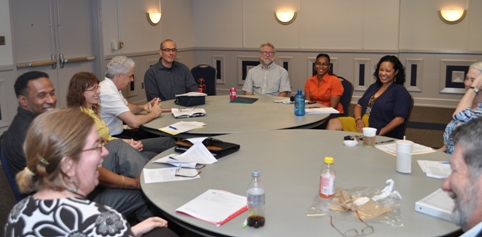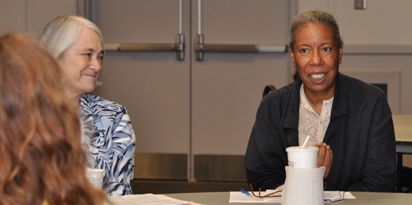College Site | Development | TOC - Department Dev Sites | CLHS TOC | Center for Law, Health & Society | News and Events | Center News | Health Equity Journal Club Generates Interdisciplinary Dialogue Health Equity Journal Club Generates Interdisciplinary Dialogue
March 30, 2011
ATLANTA - Across the Georgia State campus, faculty from a broad range of disciplines have been meeting monthly to discuss new research publications and to share their perspectives on addressing the problem of disparities in health status and access to health care, which disproportionately and adversely affect people from lower socio-economic and racial and ethnic minority backgrounds.
 The Institute of Medicine released a seminal report in 2002 entitled Unequal Treatment: Confronting Racial and Ethnic Disparities in Health Care. The report found that a significant body of research demonstrated variations in rates of medical procedures by race, with racial and ethnic minorities less likely to receive routine medical care and more likely to experience a lower quality of care.
The Institute of Medicine released a seminal report in 2002 entitled Unequal Treatment: Confronting Racial and Ethnic Disparities in Health Care. The report found that a significant body of research demonstrated variations in rates of medical procedures by race, with racial and ethnic minorities less likely to receive routine medical care and more likely to experience a lower quality of care.
Much of the IOM's report focuses on unequal access to health care. "Today, however, the field encompasses much more than concerns about inequities in health care delivery, which still exist," said Professor Charity Scott, Director of the Center for Law, Health & Society, who initially organized the journal club in January 2010. "A lot of contemporary research and scholarship focuses on the structural determinants of health, and how differences in socio-economic status, individual behaviors, cultural beliefs, environmental conditions, and other non-medical factors can influence health outcomes and result in health disparities."
The Health Equity Journal Club grew out of a desire to connect faculty across their disciplinary backgrounds who shared common research interests in addressing health disparities. It provides an opportunity for them to learn more about the field by combining the resources and knowledge backgrounds of their respective disciplines.
"Before this journal club started, I had no idea how many people across the Georgia State campus were actively researching in the health equity field," said Scott. "With time and resource constraints of busy faculty, it's often challenging to get out of our disciplinary silos. Our meetings provide a refreshing and stimulating opportunity to learn from and get to know our faculty peers across campus."
There are currently over 30 members in the journal club, with faculty from many different Colleges and disciplines, including law, health policy, sociology, public health, psychology, disability, health administration, and gerontology.
The organizers hope that the monthly get-togethers might spark new research ideas and create opportunities for interdisciplinary collaborative research in the future. "The Institute of Public Health has shown real leadership in this field," said Scott. "Under a five-year, $6.7 million grant from the National Institutes of Health, they are starting a new Center for Excellence in Health Disparities Research at GSU." The Center will include both research and outreach programs.
In other developments, additional faculty with research interests in health equity will be added under the University's Second Century Initiative. The first round of 2CI grants awarded in 2010 included a proposal from IPH and the law school, "Building Capacity in Health Justice Research: A Collaborative Research Effort to Reduce Health Disparities," which was led by Richard Rothenberg and Michael Eriksen from IPH. This three-faculty hiring cluster, for which recruitment has been underway, includes a legal scholar who will address issues of health justice, ethics, and equity (COL); an epidemiologist who will play a lead role in analytic and investigative work (IPH); and a social scientist who will lead efforts in community-based participatory research (IPH).
Under the second round of 2CI grants awarded in 2011, Daniel Crimmins, who directs the Center for Leadership in Disability within IPH, will lead an initiative to address health disparities for individuals with developmental disabilities from diverse backgrounds. This three-faculty hiring cluster will create new faculty lines in communication disorders, psychology, and public health.
"We will certainly welcome these new faculty to the journal club when they arrive," said Scott, "and look forward to their joining our conversations and sharing their perspectives and expertise."
If you are interested in joining the Health Equity Journal Club, please write to Charity Scott at cscott@gsu.edu. All GSU faculty with an interest in this field are welcome to join.